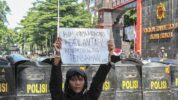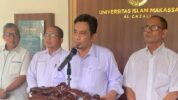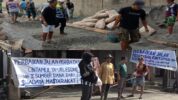26 Years On, Amnesty International Demands Government Accountability for Semanggi I Massacre
JAKARTA, RAKYAT NEWS – Today marks the 26th anniversary of the Semanggi I tragedy, one of Indonesia’s darkest chapters of human rights violations, as Amnesty International Indonesia calls on the state to fully investigate and hold accountable those responsible for the unlawful deaths of students and civilians during the 1998 unrest.
The Semanggi I tragedy is a stark reminder of the ironies of the Reformasi era. It took place on November 13, 1998, the same day the People’s Consultative Assembly (MPR) ratified the Human Rights Decree (TAP MPR No. XVII/MPR/1998).
Despite the passage of this landmark decree, the events of Semanggi I remain unaddressed in terms of accountability, with no legal processes holding perpetrators—both on the ground and in the chain of command—accountable.
“Semanggi I is not just a tragic moment in history that claimed the lives of students and ordinary civilians, but a critical juncture in the struggle for Reformasi,” said Usman Hamid Executive Director of Amnesty International Indonesia.
“This tragedy reminds us of the students’ struggle for justice—from seeking accountability for the former president, to limiting presidential powers, and abolishing the military’s dual function. Sadly, these very principles of Reformasi are being undermined by some political elites today. The families of the victims have continued to fight for justice through the ‘Aksi Kamisan’ protests, a fight that remains far from over.”
Amnesty International Indonesia has emphasized that the struggle for justice remains unresolved. “The state has failed to deliver justice for the victims of Semanggi I, and there are growing signs that the government wants to suppress these events as though they were not severe human rights violations,” Hamid continued.
In January 2023, President Joko Widodo formally acknowledged 12 cases of past human rights violations, including the Semanggi I and II tragedies. While this recognition was initially seen as a potential step towards resolution, it has yet to result in any tangible action.
“Recognition without legal action is nothing but empty rhetoric. The Attorney General has a legal and moral responsibility to investigate the perpetrators and deliver justice for the victims of Semanggi I,” Usman said.
“The lack of decisive action reflects the state’s failure to uphold human rights, which was a key promise of the 1998 Reformasi.”
The Semanggi I tragedy occurred on November 13, 1998, near Atmajaya University and the Semanggi Interchange in Jakarta, during massive student and public protests. The demonstrators, calling for the resignation of New Order-era officials, the trial of former president Suharto, presidential term limits, and the dismantling of the military’s dual function, were met with violent repression. Security forces responded with excessive force, including unlawful killings.
Reports from the Media and the Humanitarian Volunteer Team revealed that at least 17 civilians were killed and 456 others were wounded in the Semanggi I tragedy. A year later, the Semanggi II tragedy would claim 11 more lives and leave 217 injured.
Although several police and military personnel were tried for their roles in the shootings, the trials failed to deliver justice for the victims and did not uncover the masterminds behind the violence.
The victims’ families have long sought to have the Semanggi I and II cases prosecuted in a human rights court, but their requests have been repeatedly dismissed. Both the DPR (Indonesian House of Representatives) and the government have argued that the Semanggi tragedies do not constitute “gross human rights violations” as defined in Law No. 26/2000 on the Human Rights Court.
In 2020, the Administrative Court ruled in favor of the victims’ families, but the Attorney General’s Office appealed the decision. In 2021, the Supreme Administrative Court overturned the ruling, and the Supreme Court later rejected the families’ cassation appeal.
The Semanggi I tragedy symbolizes the struggle for justice in Indonesia’s Reformasi movement. One of the significant achievements of Reformasi was the establishment of a legal framework for prosecuting gross human rights violations through the Human Rights Court, created under Law No. 26/2000.
However, over two decades after the law’s enactment, hopes for justice for the victims of Semanggi I and other human rights violations remain unfulfilled.
“The Human Rights Court, as one of the key fruits of Reformasi, seems to have been neglected in investigating major human rights violations, including Semanggi I,” said Usman Hamid. “The government, legal authorities, the National Commission on Human Rights (Komnas HAM), and all relevant institutions must fulfill the mandate of the Human Rights Court as outlined in Law No. 26/2000. A firm and consistent application of the law in cases of gross human rights violations is the only way to honor the victims and their families, who continue to wait for justice.”
Amnesty International Indonesia reiterates the call for accountability and urges the government to take meaningful steps to ensure that the victims of Semanggi I and all those affected by past violations receive the justice they deserve. (Uki Ruknuddin)


























Tinggalkan Balasan